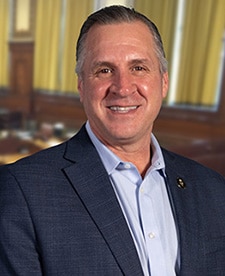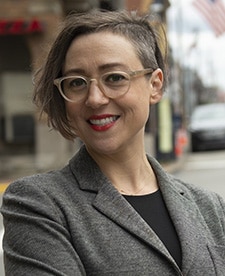The two Democratic candidates for Pittsburgh City Council District 4 are incumbent Anthony Coghill and his challenger, public servant Bethani Cameron.
District 4 comprises the Pittsburgh neighborhoods of Beechview, Bon Air, Brookline, Carrick, Mount Washington, and Overbrook.
Their answers to our voter guide questions for the May 18, 2021 Primary Election are below.
1) What causes hunger and food insecurity in our city/county, and what policies will you support or implement to address this beyond support for emergency or charitable food distribution?
Cameron: Food deserts and poverty are huge contributors to food insecurity. Lack of proper nutrition lowers community-wide health outcomes and hunger prevents our neighbors from participating in our community. I would support grocery trucks (like food trucks + farmer’s market combo, can be at different neighborhoods on different regular days), and I would mandate that development include access to nutrition for those living around new developments. I would also work with the small business folks in the administration to create a pop-up store and work with local groceries to stimulate a market for stores and generate interest from residents.
I would also love to expand the farmer’s market vouchers for fresh food for seniors. Getting fresh food to those who have no access has to be a long-term priority for community help.
Coghill: There are many causes to hunger and food insecurity with no simple solution, especially when considering medium to long term solutions.
However, I am working to address hunger and food insecurity by combating economic inequality in the district. Creating locally owned business helps to grow local economies and Beechview’s Broadway Ave. has seen tremendous investment that has helped to shepherd many small businesses into our main street in spite of the hardships wrought by the pandemic.
One of the small businesses that has grown during this period is the Las Palmas IGA grocery store. The building, previously owned by Pittsburgh’s Urban Redevelopment Authority, has recently been purchased by Las Palmas and is now locally owned. This grocery store serves many people in Beechview and the district at large, especially our Latino population who are a driving force behind the neighborhood’s renaissance.
By focusing on local improvements to economies and main streets, we can create the spaces needed to address the structural and systemic problems that contribute to hunger and food insecurity. I am working to expand these efforts across the district so emergency food assistance is just that, an emergency resource, not a family’s weekly solution.
2) What will you do to improve Pittsburgh/Allegheny County residents’ access to healthy, affordable food? Should the following assets play a role? If so, what should the city government do to strengthen them?
Cameron: The city should mandate food access be included in new developments as it does affordable housing by utilizing a specific zoning code overlay.
A. Public transportation
Cameron: Public transit should always be factored in when working addressing community nutrition; not everyone has access to a car or even a bike, so we must make sure that public transit creates access to mobility and food! I would work with the Port Authority on ensuring that when routing is discussed (especially when routes are cut) to ensure all neighbors have access to fresh and nutritious food.
Coghill: Public transportation and issues of access and mobility are keys to connecting individuals to resources. Thankfully, the communities I represent have good access to public transportation making it easier for people, but that doesn’t mean there is not plenty of room for improvement. I am working with the community and Port Authority of Allegheny County to make sure that more of the Light Rail stops along Broadway Ave. are handicap accessible and in key locations.
B. Corner stores in low-income neighborhoods
Cameron: Years ago I learned about a corner store program which ensured fresh food was in stock and at eye level in convenience stores located in food deserts. We can work with local bodegas/convenience stores and grocers/farmers to ensure fresh food is available everywhere.
Coghill: I mentioned previously how I’ve worked to expand small businesses in the district and one of these businesses is a corner market directly across from a public transportation stop. I recognize that having locations like this can serve a purpose in making sure individuals do not have to travel far to purchase food. I am so happy that the locally owner corner market is serving the community and I aim to assist more businesses like this in all of the communities in District 4.
C. Farmers markets
Cameron: The voucher program tha granted seniors $20 in fresh food from farmer’s markets was hugely popular. I would like to expand that program and increase the amount allocated to each household. I’d love to get farmer’s/farm managers together with community leaders to find further opportunities to increase access to fresh, healthy food, and to encourage collaboration when it comes to community nutrition!
Coghill: I love farmers markets, not just because I enjoy fresh fruit, but because partnerships with groups like Just Harvest help individuals with ACCESS cards to stretch their dollars further and be rewarded with healthy food!
One of my districts largest farmers market is in Carrick and is held at the Dairy District Pavilion. In the last year, the economic development group who had owned the site has since disbanded and I have stewarded the site’s ownership to another local group. As part of this process one of my main concerns was the farmers market and I am happy to say that the new owners have committed to keeping the pavilion available for public use, including for farmers markets.
D. Urban agriculture
Cameron: The potential to partner with urban gardeners, farmers, organizations like Grounded, and neighbors to create spaces for growing food and ensuring that what isn’t needed is rescued by organizations like 412 Food rescue so we can avoid waste and get food in bellies!
Coghill: I believe strongly that urban agriculture is key to food independence and that is why I am working on building a 1-acre farm in Brookline Memorial Park that will produce food and educational programming. My vision for the farm is as a location that influences generations of Pittsburghers to grow their own food and understand how they can support local, sustainable food production. I recognize that very few people will be able to grow all the produce they need, but by connecting people to the food they eat and providing educational opportunities we shape individuals who shape the character of local food production.
This farm is only the start, some of our city neighborhoods have lots upon lots of open space that is yearning to grow food, we just need to plant the right seeds.
3) What policies, if any, would you support or implement to ensure that low-income communities and communities of color are equitably served by the supermarket industry?
Cameron: I would work with private companies to ensure hiring practices reflect the wider community, and I would work with supermarkets to create pop-up shops and work toward more permanent access to fresh foods with active partnership from our local supermarket industry. I’d also love to work with local grocers to create mutually beneficial solutions to the problems of food access and community health!
Cogill: Like much of America, the supermarket industry is built around transportation. Providing more public transportation options that connect communities to established supermarkets is a start and can help reduce some barriers.
More importantly, locally owned groceries and community driven markets can be most responsive to the food needs of a community. I’ve worked to make sure that local markets and groceries in my district are locally owned and managed, and I hope to continue this work.






Comments are closed.